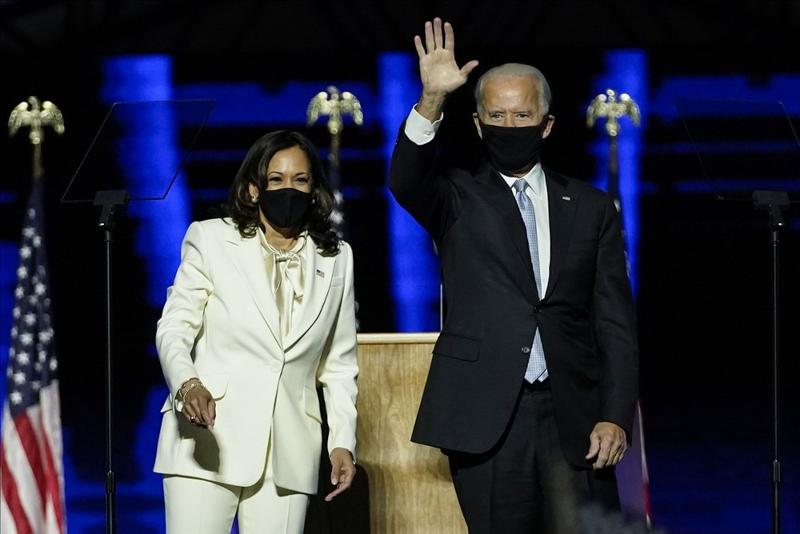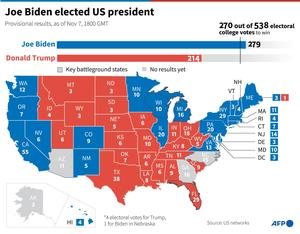 US Democratic nominee for president Joe Biden and his running mate Kamala Harris deliver remarks in Wilmington, Delaware, on November 7, 2020. (ANDREW HARNIK / POOL / AFP)
US Democratic nominee for president Joe Biden and his running mate Kamala Harris deliver remarks in Wilmington, Delaware, on November 7, 2020. (ANDREW HARNIK / POOL / AFP)
WASHINGTON - Democrat Joe Biden declared victory for the US presidential election on Saturday night, days after Election Day, since races in several battleground states were too close to call with a record number of mail-in ballots to be counted.
President Donald Trump hasn't conceded defeat but vowed to take what he believes are election misconduct to the court, thrusting more uncertainty upon an already exhausted and divided country.
URGING UNITY AMID DEEPENING DIVISION
Speaking from Wilmington, Delaware, Biden touted a "clear" and "convincing" victory while repeating a message of unity after a politically polarized election.
President Donald Trump hasn't conceded defeat but vowed to take what he believes are election misconduct to the court, thrusting more uncertainty upon an already exhausted and divided country
"I ran as a proud Democrat. I will now be an American president. I will work as hard for those who didn't vote for me - as those who did," he said.
Trump signaled on Saturday that he would not accept Biden's victory and vowed to mount legal challenges in court.
Biden's remarks came multiple hours after major US media networks called the presidential race in favor of him after he was projected to take Pennsylvania, a key "battleground state" carrying 20 electoral votes.
In addition to Pennsylvania, Biden was forecast to win back Midwestern states of Wisconsin and Michigan, which have 26 electoral votes together. These three states, once dubbed as the "blue wall," all went to Trump's column in 2016.
For Trump, he held onto Florida and Ohio. The races in Georgia and North Carolina have not been called.
ALSO READ: Biden predicts victory as his lead over Trump grows
Meanwhile, Democrats are expected to keep control of the House but their majority is expected to be narrower. In the Senate races, Republicans and Democrats are deadlocked at 48 seats each for now.
Crowds of people gathered in Washington, DC, Austin and other cities to celebrate Biden's projected victory.
As of Saturday evening, Biden has received nearly 75 million votes nationwide, while Trump has garnered more than 70 million, according to Fox News. Both have broken Barack Obama's record for popular vote set in 2008.
"The election revealed the US is now one country but two nations," tweeted Richard Haass, president of the Council on Foreign Relations, a US think tank. "We have sorted ourselves into communities & regions with those of similar views. They will have to coexist; whether they can work together remains to be seen."
LEGAL CHALLENGES
"This election is far from over," Trump said in a statement earlier in the day, adding that starting Monday, "our campaign will start prosecuting our cases in court."
The Trump campaign has already launched multiple lawsuits in several battleground states, including Pennsylvania, Michigan, and Georgia.

The campaign has also called for a recount in Wisconsin, while a state official in Georgia has said there would be a recount in the "Peach State" due to a small margin.
Supporters of the president gathered in places across the United States on Saturday, insisting that the election hasn't finished.
Hundreds of Trump's supporters gathered at the Arizona Capitol on Saturday afternoon, protesting that the presidential race was called for Biden.
Trump has previously suggested that he may take the cases to the US Supreme Court, where conservatives have a solid 6-3 majority, including three justices nominated by him.
In 2000, the country's highest federal court decided in a disputed recount of votes in Florida with a 5-4 ruling, effectively handing that year's presidential election to the Republican presidential candidate and then-governor of Texas George W Bush, who won 271 electoral votes, one more than a majority.
ALSO READ: Biden moves ahead in Georgia and Pennsylvania
Christopher Galdieri, a political science professor at Saint Anselm College in northeastern state of New Hampshire, told Xinhua that unlike the 2000 Florida case "there are no clearly litigable questions" this year.
"The Trump strategy seems to be to file lots of lawsuits," Galdieri said. "This is very much a long-shot strategy and I am skeptical that it will work for them."
Besides, election disputes would have to go through lower courts before they could reach the high court, according to other US election and legal experts.
 People celebrate the victory of Joe Biden in the 2020 presidential election in West Hollywood, California, on November 7, 2020. (DAVID MCNEW / AFP)
People celebrate the victory of Joe Biden in the 2020 presidential election in West Hollywood, California, on November 7, 2020. (DAVID MCNEW / AFP)
A federal law sets what is called the "Safe Harbor" deadline, falling on Dec 8 this year, the day by which states must submit the winner of the presidential election if they are to be insulated from legal disputes.
Electoral College representatives will meet six days later, on Dec 14, to formally select the next US president. The US Congress will meet in joint session to count the electoral votes on Jan 6 next year. The Inauguration Day is Jan 20.
DAUNTING CHALLENGES
Biden has made the ongoing COVID-19 pandemic a central issue of his presidential bid and put Trump on the defense in their debates over the public health crisis, which has infected more than 9.8 million people in the United States, with nearly 237,000 deaths.
The country set a new record on Friday when the number of its daily cases reached more than 125,000.
Biden said Saturday night that he will name a group of scientists and experts as "transition advisors" to convert his plan to respond to the pandemic into an action blueprint.
"We cannot repair the economy, restore our vitality, or relish life's most precious moments ... until we get this virus under control," he said.
"Everything hinges on his administration's efforts to control the pandemic," Clay Ramsay, a researcher at the Center for International and Security Studies at the University of Maryland, told Xinhua.
READ MORE: A US presidential election like no other
According to The Washington Post, Biden is also planning to quickly sign a series of executive orders after taking office to rejoin the Paris Climate Accord, return to the World Health Organization, revoke a ban on immigration from some Muslim-majority countries, and allow "Dreamers," brought to the United States illegally as children, to remain in the country.
 Supporters of US President Donald Trump rally after Democratic nominee Joe Biden won the 2020 presidential election in Beverly Hills, California on November 7, 2020. (DAVID MCNEW / AFP)
Supporters of US President Donald Trump rally after Democratic nominee Joe Biden won the 2020 presidential election in Beverly Hills, California on November 7, 2020. (DAVID MCNEW / AFP)
Other leaders who sent congratulatory messages included Canadian Prime Minister Justin Trudeau, German Chancellor Angela Merkel, NATO Secretary General Jens Stoltenberg, Egyptian President Abdel-Fattah el-Sissi, Indian Prime Minister Narendra Modi, Japanese Prime Minister Yoshihide Suga and Iraqi President Barham Salih.
Biden, 77, announced his bid for the White House, the third in his political career, in April 2019.
The political veteran, who served as US vice president from 2009 to 2017, formally accepted the Democratic presidential nomination in August this year, with Senator Kamala Harris of California as his running mate.
With inputs from Zhao Huanxin in Washington


